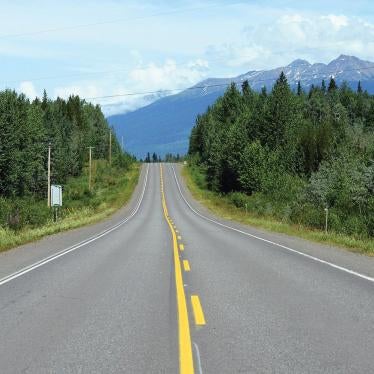In July, 2012, Lydia N. (not her real name) sat in a hotel room not far from Highway 16 – the “Highway of Tears” in northern British Columbia where so many indigenous women and girls have been murdered or disappeared – and told me about her efforts to keep her 15-year old daughter safe from violence. She said she had spoken to the police six times, urging them without success to press charges against her daughter’s adult boyfriend for an incident in which he choked her daughter on a public street. It was not the first episode of abuse, and Lydia doubted it would be the last. She told a constable, “The next day you hear from me you’re going to hear that my daughter’s dead.” In the end, she said, “We’re First Nations and they just don’t care. That’s how I feel.”
The sentiment was not uncommon as Human Rights Watch interviewed indigenous women and girls across northern B.C. for a report about their treatment by police. However, the “they” who didn’t care wasn’t always just the police, but often the government, and sometimes the community at large. As another woman told us, having seen the authorities’ reactions to her sister’s murder decades ago and to more recent crimes in the community, “If we go missing who is going to care except for our family?”
Sadly, statements from the current government do little to challenge these beliefs. Prime Minister Stephen Harper, when questioned in December about calls for a national inquiry into the more than 1,200 indigenous women and girls murdered or disappeared across Canada, said, “It isn't really high on our radar, to be honest.” The government has repeatedly rejected calls to establish an independent national commission of inquiry into the violence against indigenous women and girls, who represent only 4.3 per cent of the female population – but fully 16 per cent of female homicide victims. This intransigence has persisted even as the separate 2014 murders of Tina Fontaine and Loretta Saunders have made headlines, brought the issue onto the public radar, and ignited widespread outrage at the continuing violence.
If the Canadian government has chosen to ignore demonstrated violence against indigenous women and girls, it has registered loud and clear on the global human rights agenda. The Inter-American commission has an official role in monitoring human rights in the region, as a part of the Organization of American States, which Canada joined in 1990. At the urging of the Native Women’s Association of Canada and the Feminist Alliance for International Action, the commission undertook an in-depth investigation, interviewing dozens of government representatives, civil society experts, and family members of victims.
The commission concluded, “According to the information received, the police have failed to adequately prevent and protect indigenous women and girls from killings and disappearances, extreme forms of violence, and have failed to diligently and promptly investigate these acts.” These findings are consistent with Human Rights Watch’s study, as is the commission’s recommendation: “Ensure adequate oversight of officials responsible for responding to and investigating crimes of violence against women, and ensure that administrative, disciplinary or criminal measures are available to hold such officials accountable.”
In addition, the commission’s report recognizes the need to address the structural discrimination and socioeconomic dynamics behind the violence. Citing a history of discrimination including colonization and residential schools, the commission calls attention to the fact that “indigenous women and girls constitute one of the most disadvantaged groups in Canada. Poverty, inadequate housing, economic and social relegation, among other factors, contribute to their increased vulnerability to violence.”
No doubt some in the government will see this report as another 125 pages to ignore and argue that no further study is required. That would be a mistake. Indeed, the commission itself acknowledges there is more to understand and “strongly supports” the creation of national action plan or nationwide inquiry – critically, one that is organized from beginning to end in consultation with indigenous peoples, particularly indigenous women and girls. With a national roundtable on the murders and disappearances coming up in February, the government should take this opportunity to announce its intention to form an inquiry and begin consultations.
The commission’s report shows that the international community cares about the lives of indigenous women and girls. So does the Canadian public. The government should do the same.






